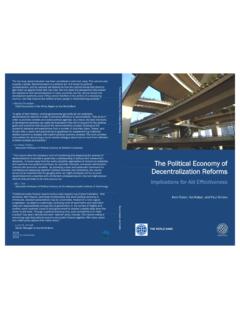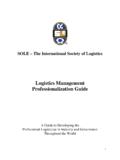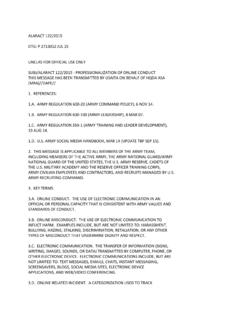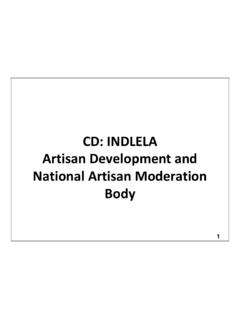Transcription of Teacher Motivation Incentives and Working Conditions
1 1 (24 February 2009) Teacher Motivation Incentives and Working Conditions Policy Brief #8 (Final Draft) Key Policy Questions/Decisions on Teacher Motivation - Incentives and Working Conditions Policy 1: Are the monetary Incentives for teachers sufficient to attract quality individuals to the profession? Policy 2: What indirect monetary Incentives such as housing, transportation, food, paid leave, advanced study and training are necessary to attract and retain good teachers? Policy 3: Can or should perverse Incentives such as private tutoring be controlled or outlawed?
2 Policy 4: What mechanisms can a society use to raise the prestige and recognition of the teaching profession? Policy 5: Can job security, stability, benefits and other aspects of the teaching profession be combined with Incentives to improve teaching behavior and student learning? Policy 6: Should student achievement be considered in promotion and advancement in the teaching profession? Policy 7: What aspects of Working Conditions : classrooms, heating, lighting, laboratories, textbooks, libraries and other materials are necessary for teachers to be optimally productive?
3 Policy 8: Are the laws, rules and regulations controlling the teaching profession clear, fair, and unbiased? Policy 9: Should special allowances be given to teachers willing to work in isolated, rural or dangerous areas of the country? Policy 10: Should all teachers be on the same salary schedule, or should there be a differential between primary and secondary or for certain specialized subject areas? Policy 11: What Incentives motivate teachers to change their teaching behavior? Policy 12: How should released time, supervisory roles, mentoring roles and other professional Incentives be awarded equitably?
4 Incentives are sometimes used by government and education leaders to encourage teachers to behave differently, presumably in ways that promote the ends desired by those giving the Incentives . For example, Incentives might be designed to attract current teachers to remain in teaching, to accept Introduction Motivation comes from many sources. Some teachers are motivated by their love of children and of teaching, some by more external factors such as a stable salary or the advantages of having more leave time.
5 To the extent that education leaders understand what motivates teachers, it may be possible to provide Incentives in ways that promote better quality education. But it is easy to oversimplify. Most teachers are motivated by a complex combination of internal and external factors. Incentives used to motivate some teachers may antagonize others. 2 assignments in remote schools, or to use new teaching methods in their classroom. The idea of using Incentives to shape Teacher behavior is not new.
6 Virtually all educators understand the basic idea. Nonetheless, while some incentive systems work well, many fail. When an incentive system fails, the resources used for those Incentives are gone and the intended goals are still not achieved. This leaves the education system worse off than if no special Incentives had been used. While some Incentives , such as increased salary, are easy to understand and implement, many others are not. One risk, then, is a tendency of policy-makers to favor incentive systems that are easy to design and implement over incentive systems that are likely to yield more substantial and longer term outputs, but which are more expensive or complicated.
7 This policy brief seeks to address how education officials can use Incentives to influence teachers career decisions and classroom practice. The brief examines several issues surrounding the factors that have been found to motivate teachers to make career choices or adopt teaching practices desired by those offering the Incentives . The focus is on those Incentives that can be reasonably influenced by education officials interested in improving the performance of the education system.
8 The questions posed and answered are based on those raised in policy discussions with various education colleagues, especially in South Asia. The purpose of the brief is to provide a concise knowledge resource on policy and implementation considerations, and alternative practices, regionally and internationally. 1. What are Incentives ? Incentives are a form of encouragement to take action. They are the direct and indirect benefits offered to teachers as intrinsic motivators.
9 Put in other words, they are the application of additional inputs that shape the education process to achieve the eventual outputs of education in desirable ways. Three kinds of Incentives have particular relevance for teachers: monetary Incentives (direct and indirect), non-monetary Incentives and perverse Incentives . Each is discussed below. Monetary Incentives can either be direct or indirect benefits. Direct monetary Incentives refer to salary and allowances that teachers receive for their work.
10 The most direct and effective way to increase the number of secondary school graduates entering teaching and to encourage those already in teaching to remain as teachers is to increase salary to a level that makes teaching more attractive than alternative career options. While raising salaries is an effective incentive for building a more qualified teaching force, it is not very useful for shaping the specific behaviors of individual teachers. Furthermore, once a Teacher is given a salary increase, it is generally permanent.
















